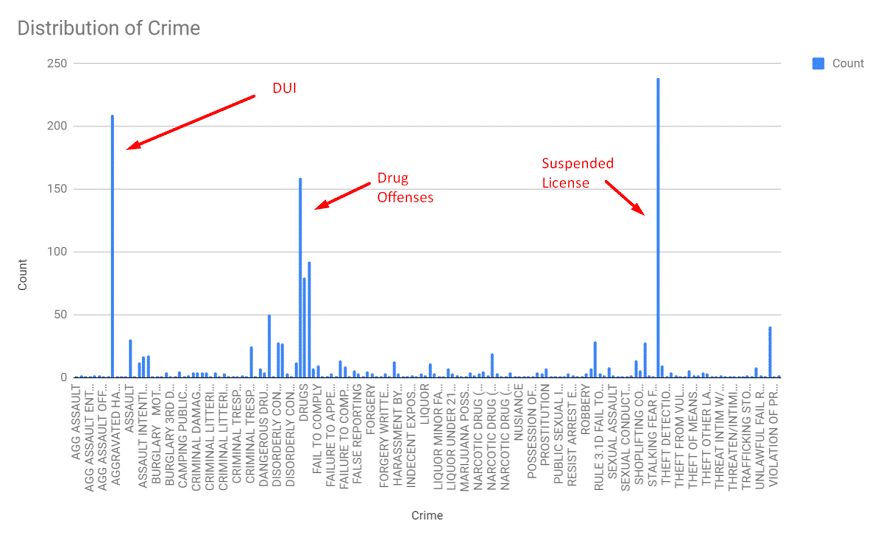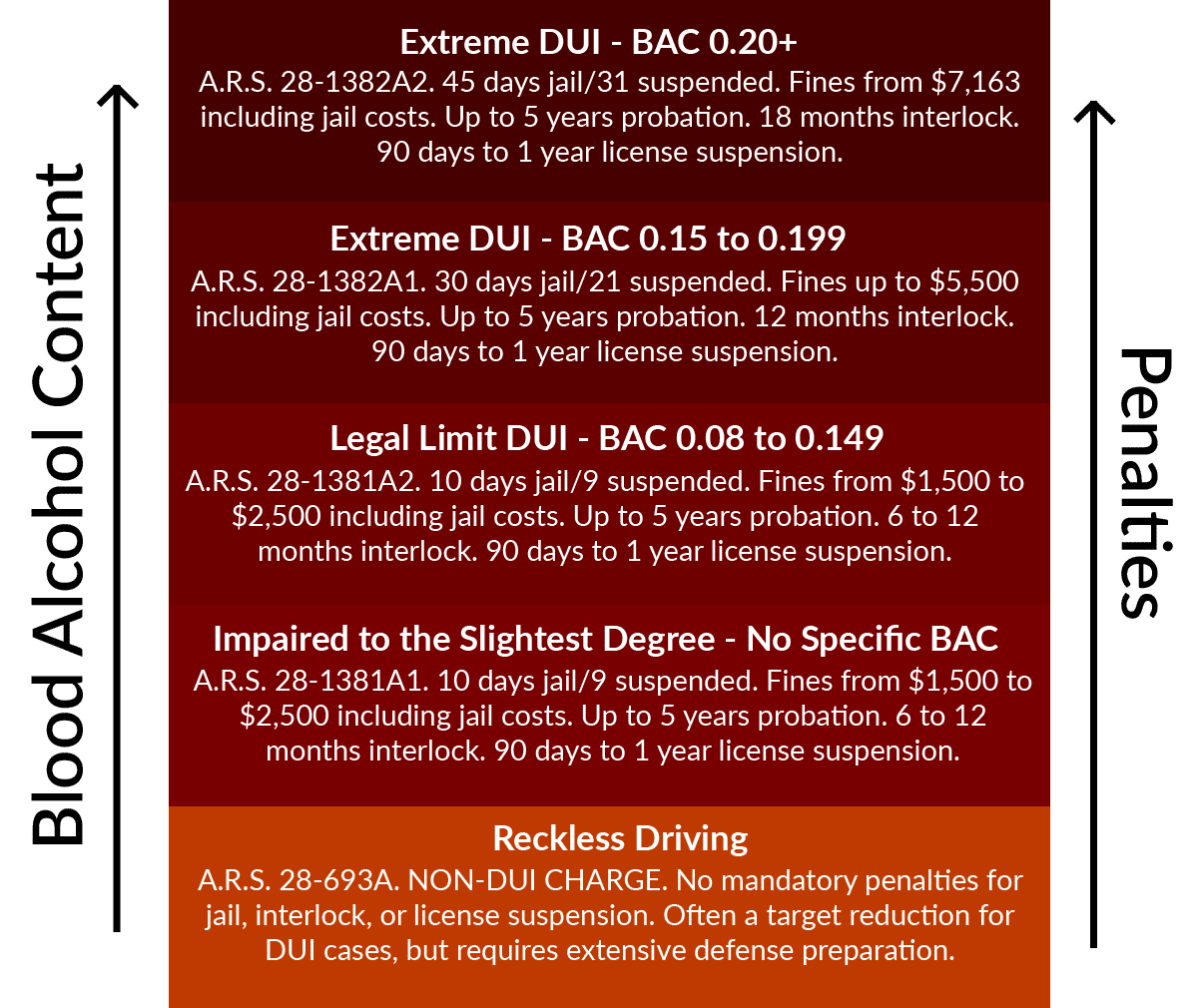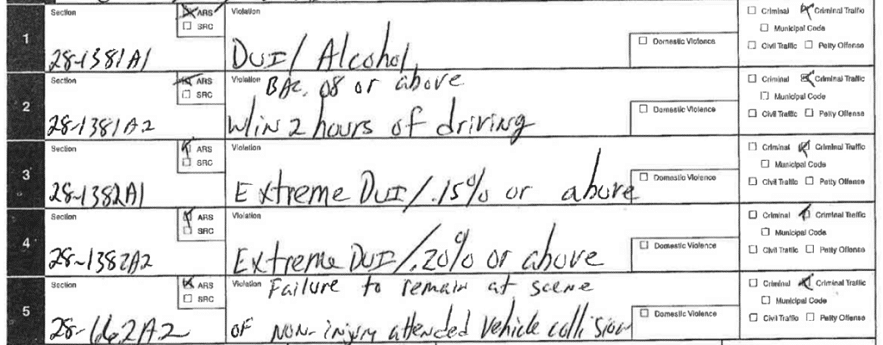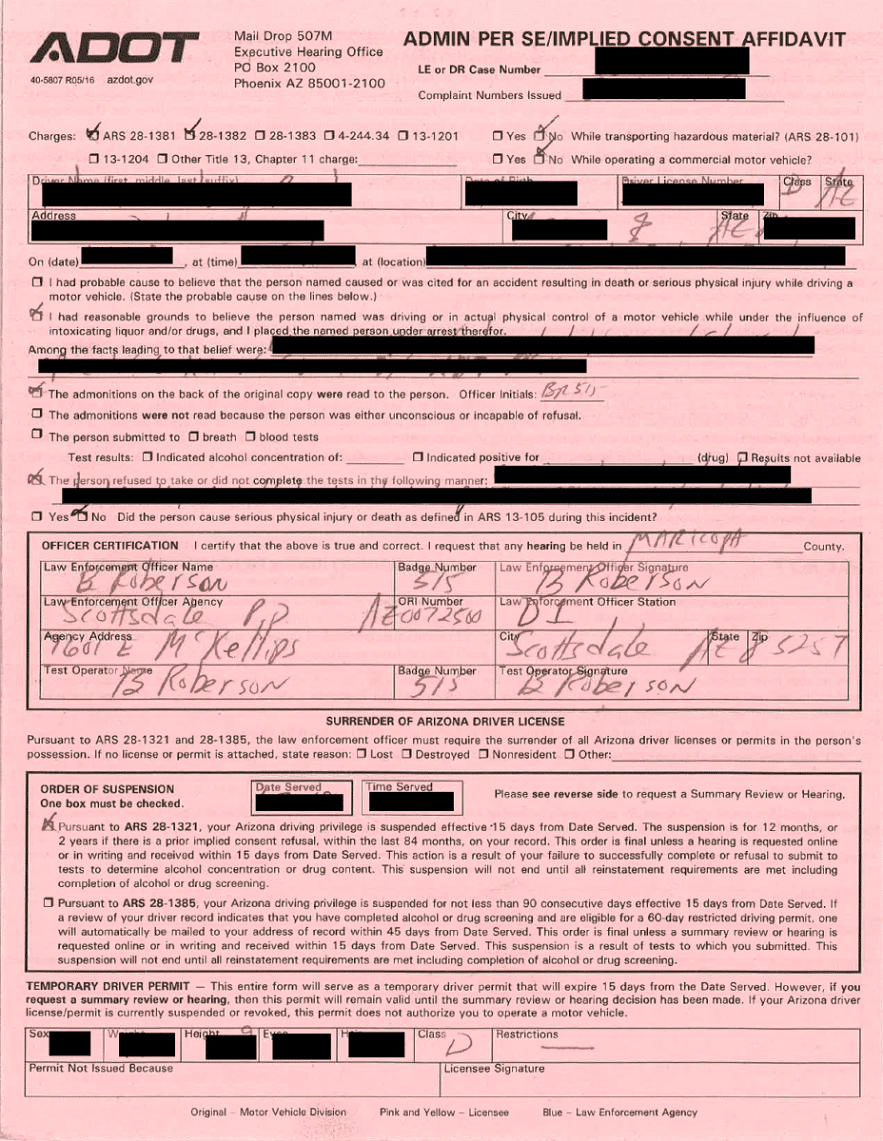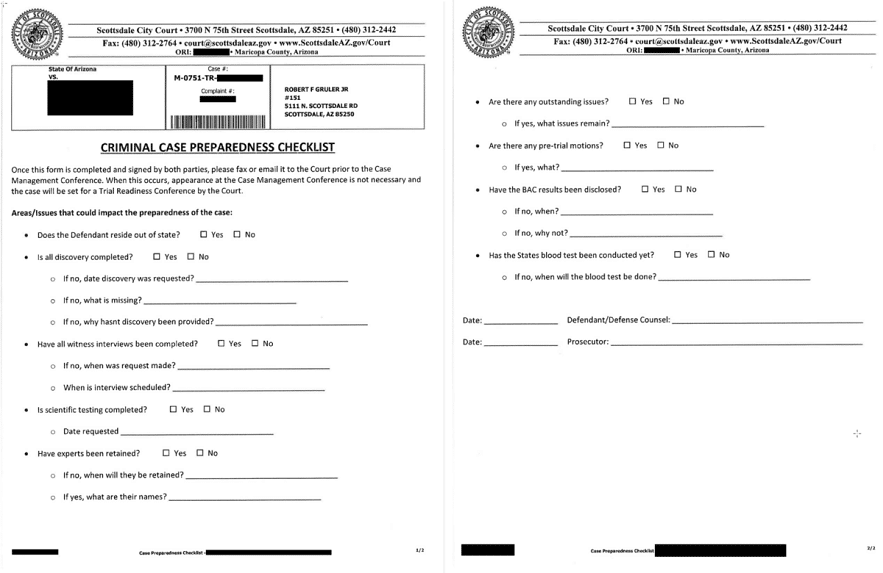Award Winning Scottsdale DUI Attorney

DUI Lawyer in Scottsdale
R&R Law Group is an award-winning defense team practices solely in criminal law based in Scottsdale, AZ. If charged with a DUI in Arizona, meet with an experienced Scottsdale DUI lawyer at R&R Law Group.
Driving under the influence charges are one of the most common types of offenses issued by the Scottsdale police.
Officers routinely monitor areas of activity around certain locations, like Old Town Scottsdale, Scottsdale Quarter, and the sporting stadiums to stop drivers on suspicion of driving under the influence.
Every week Scottsdale makes approximately 100 arrests, and a large portion of those are DUI related as seen in the chart below.
We gathered this data over about 3 months, and as you can see, DUI charges are the second most common type of case.
The number 1 most common offense is driving on suspended license charges. These are usually identified as a result of every other traffic stop which explains why they are so numerous. Drug offenses are number 3, and are usually charged alongside DUIs.
No other type of charge even comes close. This is because the Scottsdale police department, prosecutor’s office, mayor, and city counsel focus a ton of time and effort on DUI enforcement.
Every weekend, police are out in full force, monitoring the so-called “hotspots”, stopping people for any reason they can conjure up to issue DUIs.
If you have been charged with a DUI in Scottsdale and need information, defense strategies, and an overview of how our defense attorneys fight back in DUI cases, we hope you find this guide helpful.
What are the penalties for DUIs in Scottsdale, Arizona?
Scottsdale DUI laws are some of the harshest in the country.
Every type of DUI conviction requires jail, an interlock device, fines and fees, license points, and a suspended license.
Penalties increase based upon the level of blood alcohol content, as seen in the chart below.
1st offense, Impaired to the Slightest Degree or BAC 0.08+ DUI
- 10 days jail, 9 days suspended with substance abuse screening and follow-up treatment
- Fines & Surcharges of $1,513 + $20 time payment fee
- Jail costs of between $290 to $965
- Up to 5 years probation
- Community restitution, if applicable
- 12 months interlock device (might be eligible for an early removal after 6 months)
- 90 days license suspension (or 1 year for a refusal) – CDL driver results in 1 year revocation.
1st offense, Extreme DUI, BAC 0.15 to 0.199
- 30 days jail, 21 days suspended with substance abuse screening and follow-up treatment, home detention eligible after 20% served
- Fines & Surcharges of $2,763 + $20 time payment fee
- Jail costs up to $2,665
- Up to 5 years probation
- Community restitution, if applicable
- 12 months interlock device
- 90 days license suspension (or 1 year for a refusal) – CDL driver results in 1 year revocation.
1st offense, “Super” Extreme DUI, BAC 0.20+
- 45 days jail, 31 days suspended with substance abuse screening and follow-up treatment, home detention eligible after 20% served
- Fines & Surcharges of $3,223 + $20 time payment fee
- Jail costs up to $3,940
- Up to 5 years probation
- Community restitution, if applicable
- 18 months interlock device
- 90 days license suspension (or 1 year for a refusal) – CDL driver results in 1 year revocation.
The penalties for a 2nd offense DUI are substantially harsher.
A second offense can only be charged if the prior offense happened within the prior 7 years.
Any third or subsequent DUIs will be considered felonies and are aggravated DUIs that are not handled in the Scottsdale court.
2nd offense, Impaired to the Slightest Degree or BAC 0.08+ DUI
- 90 days jail, 60 days suspended with substance abuse screening and follow-up treatment. Eligible for home detention.
- Fines & Surcharges of $3,473 + $20 time payment fee
- Jail costs of between $2,665 to $7,765
- Up to 5 years probation
- Community restitution, if applicable
- 12 months interlock device (might be eligible for an early removal after 6 months)
- License revocation
- Minimum 30 hours community service
2nd offense, Extreme DUI, BAC 0.15 to 0.199
- 120 days jail (serve 24 days with remaining on home detention)
- Fines & Surcharges of $3,723 + $20 time payment fee
- Jail costs up to $10,315
- Up to 5 years probation
- Community restitution, if applicable
- 12 months interlock device
- License revocation
- Minimum 30 hours community service
2nd offense, “Super” Extreme DUI, BAC 0.20+
- 180 days jail (serve 20% of jail time with remaining on home detention)
- Fines & Surcharges of $4,393 + $20 time payment fee
- Jail costs up to $15,415
- Up to 5 years probation
- Community restitution, if applicable
- License revocation
- Minimum 30 hours community service
What are the DUI laws in Scottsdale and Arizona?
Many people hear that Arizona has “no tolerance” laws, and this is true to an extent.
In Arizona, DUI charges can be broken into two major categories, misdemeanor DUI offenses and aggravated DUI offenses.
Aggravated DUI cases are felonies, and are not allowed legally to be heard in the Scottsdale City Court. A person can get an aggravated DUI when they meet the criteria for a regular misdemeanor DUI, but have an “aggravating” factor, like having kids in the car, a suspended license, or have had multiple prior DUIs.
This page focuses on misdemeanor DUI cases in Scottsdale.
Within the category of misdemeanors, there are 3 different classifications: Class 1, Class 2 and Class 3.
Class 1 offenses are the most serious, and all DUI offenses are Class 1 offenses.
The maximum penalty for class 1 misdemeanors (generally these are only the maximum and not what our clients actually receive) are as follows:
- Up to 6 months in jail
- Fines and fees of $2,500 plus surcharges
- Up to 5 years probation
Most DUI resolutions do not involve anywhere close to 6 months in jail or 5 years of probation, especially out of Scottsdale.
However, it is important that you know these maximums, as theoretically it is possible to receive this sentence and the Judge must be sure that you are aware of this possibility.
In reality, the standard penalties for DUIs are discussed in the next section.
Within misdemeanor DUI categories, there are four different alcohol-related DUI offenses and one drug-related DUI offense.
The alcohol-related offenses are separated mostly around a person’s alleged blood-alcohol content level, or “BAC”.
Impaired to the Slightest Degree
The first, lowest level alcohol offense is a DUI for being what is called “impaired to the slightest degree.”
This means that the government can charge you with a DUI regardless of what your official blood-alcohol content is if they can determine that you were impaired at all.
Evidence of this type of impairment usually comes from field sobriety testing, such as a the pen test, the walk & turn test, or the one-leg stand test.
Police use these tests to show a person is “impaired.”
In reality, these tests are not generally easy to pass, even for those who do not drink or who are not under any sort of influence.
If the police charge you with impaired to the slightest degree DUI, it is usually coupled with other DUI charges, such as the legal limit DUI.
Legal Limit
The legal limit in Arizona is 0.08, as it is most elsewhere around the country.
For a 180 pound man, this is about 4 servings of alcohol within one hour; for a 140 pound woman, it is about 2.5 to 3 servings in one hour.
Keep in mind, one serving of alcohol is usually a lot less than what they serve in bars, clubs, or other outings.
The law says that if your blood-alcohol content is at 0.08 or above, the law can legally presume you were impaired and under the influence.
They do not need to prove anything, unlike in the situation where you are only charged with being impaired to the slightest degree.
The defense can rebut that presumption, but for purposes of starting the case, the law presumes impairment.
Extreme & Super Extreme DUI
The next level for alcohol DUIs is being at or above a blood-alcohol content of 0.15. This is called an extreme DUI, and penalties increase for this category.
If your blood-alcohol content is at 0.20 or above, the law carves out an additional set of increased penalties. This is often known as the super extreme DUI.
Why do I have multiple DUI charges on the same ticket?
We often speak to people who are confused as to why their ticket has multiple DUI charges, when they were stopped only one time.
This is a result of the law works.
In Arizona, the law allows charges to be stacked on top of one another, like you can see in the image above.
In many cases, these charges are only dependent upon the result of the blood or urine test.
The police and prosecutors write tickets this way for a reason.
For example, in a situation where a person has a DUI and their blood results come back at a super extreme level over the limit of 0.20 BAC. Their results may be something very close to that line, and be 0.21.
In this case, defense attorneys have obvious margin of error arguments, and should easily be able to beat the super extreme DUI charges.
Prosecutors and lawmakers did not beating one charge to result in a dismissal of the other charges.
To solve that, they separated out the various charges and allowed them to be stacked on top of one another.
So in this example, if the super extreme DUI charge is thrown out, they can still move forward on the other, lower charges.
Being charged with multiple DUI offenses does not mean that each of the penalties listed on this page will be stacked on top of one another.
In reality, most DUI charges are dismissed or negotiated away in a plea agreement.
What is an Admin Per Se and what do I do with this?
Any time you are charged with a DUI in Scottsdale, documents are filed in two places.
The criminal complaint is filed with the Scottsdale City Court and the Admin Per Se, seen below is filed with the Motor Vehicle Department.
The Court deals with the criminal matters and the MVD controls driving privileges.
In most cases, the most time sensitive issue that exists is regarding your driving privileges.
Reading the fine print on the document, you will see that you only have 15 days to request a hearing with the MVD from the time you received the admin per se.
Failure to request this hearing will mean you lose the opportunity to request a hearing completely!
When our office helps people through this process, this is one of the first items we address on any case.
Simply making the hearing request preserves a person’s driving privilege while the criminal case progresses in the court and gives our defense team the time we need to gather evidence, complete interviews, review blood results, and many other items.
Then, after the case develops further, we are able to determine whether the case should move forward with a hearing in the MVD and we are prepared to succeed if we choose that route.
If you are interested in requesting a hearing, please follow our guide located here or you can visit the MVD website directly by visiting this link.
Will my DUI suspend my license? For how long?
Any conviction for a DUI will result in a license suspension in Arizona.
Arizona reports any suspensions out of state, so a suspension within Arizona will transfer out of Arizona. To learn more about what your home state will do with an Arizona suspension, it would be best to consult with an attorney in that jurisdiction.
As explained above, one of the most time sensitive issues when dealing with a DUI is to address driving privileges.
In the form above, you can see that two options are possible.
The top box is checked with the police ask for a sample of blood, breath, or urine and are refused. This is called a refusal, and the MVD will automatically suspend a person’s license for 1 year, regardless of whether that person was impaired.
Even though this box says your license may be suspended for 1 year, there are other options that may be possible regarding obtaining a restricted license so this does not result in a total suspension for an entire year.
The bottom box is checked when a person agrees to provide a sample and the police do not need to get a warrant. This results in a 90 suspension, that can often be broken into a 30 days total suspension and a 60 day restricted license.
You have a right to have a hearing as to either of these suspensions, but only if that hearing request is filed within 15 days of receipt of the admin per se.
Filing the request puts a stay or a hold on the automatic suspension, and you can continue to drive pending the outcome of the hearing.
In many cases, the police will confiscate a person’s driver’s license. In this case, the admin per se acts that the temporary driver’s license pending the outcome of the hearing.
What happens at court for a DUI case in Scottsdale?
Scottsdale is a very high volume court when it comes to DUI prosecutions. They have structured their entire prosecution and court procedures around DUI in many aspects.
They have certain naming structures and requirements at different stages of the case, and to be successful, it is important to understand all aspects of the Scottsdale City Court.
What is the first court date in a Scottsdale DUI?
The first court date in a Scottsdale DUI case is called an arraignment and is not specific to DUI cases, in general.
At an arraignment for a DUI, you would attend court and wait in a room with many other people charged with a variety of crimes.
The judge calls each person up individually and asks how they would like to proceed with their case.
For example, you have the (rarely advised) option of pleading guilty at the very first court date.
If you would like to apply for a public defender, you may also do so at the first setting.
In some situations, the city prosecutor or their legal assistant may have a plea offer that will explain to you. This is almost always rejected.
Instead, in the vast majority of all cases, the arraignment is an opportunity to have the maximum penalties explained to you, enter a plea of not guilty as to all charges, and then request a new court date.
If you hire a lawyer, you will not need to attend this court date. Your attorney will enter a not guilty plea for you, and the case will be rescheduled in about 30 days.
What is a Pre-Trial Conference in a Scottsdale DUI case?
The pre-trial conference is first substantive court date in a Scottsdale DUI case.
After the arraignment, your lawyer will begin the process of requesting all of the discovery in your case.
This includes items like:
- Police report
- Officer notes
- Body camera footage
- Dash camera footage
- Jail footage
- Recorded interviews
- Pictures / photographs
- Witness statements
- Test results (blood result / intoxilyzer, etc.)
Most of this material should be delivered prior to the pre-trial conference. However, if there are any outstanding items that are missing, these can be addressed at the pre-trial conference.
The pre-trial conference is usually basic and brief. Your attorney will attend this setting on your behalf.
If you choose to represent yourself or be assigned a public defender, you will need to attend this on your own, and you will be meeting with the prosecutor when they call you.
In Scottsdale, you will need to sign in and wait until you are called by the prosecutor or by your public defender.
In the vast majority of DUI cases, your case will not be resolved at this setting and a continuance will be filed.
What happens at a Scottsdale Case Management Conference for a DUI case?
The Case Management Conference is roughly the mid-point of a Scottsdale DUI case. At this setting your lawyer will appear on your behalf to address several issues.
The court wants an update from both parties in the form a document submitted to court (above).
They want to know about any issues that are present in the case.
This includes items like the following:
- Problems with discovery or disclosure
- Whether pre-trial motions are going to be filed
- Whether testing results have been disclosed
- If expert witnesses have been retained / who are they and what do they intend to testify about
- Whether there are any other issues that need to be addressed
Both parties, your lawyer and the prosecutor, sign this document and turn them into the judge.
If there are issues, the court can resolve them at that time or if they require more complicated preparation, the court can set the case for oral arguments on the issues at hand.
If you have an attorney, you will not need to attend this court proceeding. Otherwise, you will need to be present.
What is a Trial Readiness Conference?
In a Scottsdale DUI case, the trial readiness conference is usually the final court date.
At this setting, you and your lawyer will decide how to proceed.
If there is an acceptable plea offer, this is usually the court setting to accept that offer and close the case.
Otherwise, this is the setting to address any final issues prior to setting the case to trial.
If your case is going to be set to trial, your attorney can usually attend this setting on your behalf and set the case to trial so long as they have your permission to do so.
If your case is set for trial, it is the Scottsdale prosecutor’s office’s practice to revoke any plea offers that were extended.
If you are intending on taking a plea deal, you will need to be present unless you are out of state, in which case you may be able to appear telephonically.
Will my case go to Trial?
It really depends!
In reality, most DUI cases in Scottsdale are resolved by taking a plea deal.
This is common across the board. The fact is that the vast majority of criminal cases (not just DUIs) do not go to trial.
However, this only makes sense if there is some benefit under the plea.
If the prosecutor’s office is not offering any reduction or any benefit, there may be no reason to accept the plea deal.
This is where it is critical to have an intensive factual and legal review of your case completed.
Our office practices in Scottsdale and has multiple DUI lawyers. You can contact us for hiring a Scottsdale DUI Lawyer.
We did not enter into the practice law to help people plead guilty, and encourage people to take their case to trial so long as it does not adversely impact them.
Who are the DUI Judges in Scottsdale?
The Scottsdale City Court has 4 main judges who handle criminal matters. In our experience, there are significant differences between the judges regarding how they operate their courtrooms.
In general, Judges cannot voluntarily dismiss DUI charges unless presented compelling legal cause. This is rare out of Scottsdale and should not be relied upon.
More important is regarding how Judges rule on pre-trial motions and settle pending issues between the defense and the prosecutor, and how they sentence in the event that there is a conviction.
Ultimately, there are dozens of variables and permutations that may affect your case and how any one particular Judge will rule.
Having handled hundreds of cases in front of these judges, our office knows specifically how they rule on important issues.
In the event that your case ends up in a bad courtroom for a particular issue, there are procedural options we have to move your case into a different forum.
Judge Statia Hendrix, Courtroom #1
Judge Hendrix was appoint to the bench as associate Judge in 2012 and has been assigned to Courtroom 1 since that time.
Over the years, her courtroom has become more and more focused on domestic violence cases, and virtually every domestic violence case we see is assigned to her court.
We have seen less DUIs assigned to her court.
For more information on Judge Hendrix, you can find the city council report on her reappointment here.
Judge Joe Olcavage, Courtroom #2
Judge Olcavage is the Presiding Judge in the city of Scottsdale and operates out of Courtroom 2. He handles all juvenile matters and any out of state telephonic change of pleas.
Judge Olcavage is a former prosecutor, working for the city of Scottsdale for 5 years as an assistant prosecutor before becoming the Assistant City Attorney and eventually the City Prosecutor.
Although Judge Olcavage is generally a reasonable and affable Judge, his sentencing policies for DUI convictions is typically not favorable.
For more information on Judge Olcavage, you can download his city council report here.
Judge Orest Jejna, Courtroom #3
Judge Jejna resides in Courtroom #3 and handles a wide variety of criminal matters.
He has been a Judge in Scottsdale since 2001, and has widely been considered to be the most reasonable Judge in Scottsdale by defense attorneys.
Anecdotally, the defense attorney community has received word that Judge Jejna has received complaints from the Prosecutor’s office for being pro-defense.
In reality, we believe Judge Jejna to be extremely fair and reasonable in DUI cases.
For more information, you can download Judge Jejna’s city council report here.
Judge Jim Blake, Courtroom #4
Judge James “Jim” Blake runs courtroom #4, and also handles virtually all types of criminal cases that come through Scottsdale.
Judge Blake runs a rigid court room, and does not like having conversations that are not appropriate for the given court proceeding. If representing yourself, it is important to understand that most appearances in court are not meant to explain your situation to the judge. The appropriate venue for that is at a trial.
Judge Blake will not entertain what he deems to be irrelevant commentary and will stay focused on addressing the very specific matters before him.
That said, Judge Blake is very knowledgeable and generally rules equitably. We have seen him hold the prosecutors to the same high standards as defense attorneys.
For more, you can download Judge Blake’s City Council Report here.
Who are the most common DUI police officers?
Having represented hundreds of people in DUI cases, we have seen the same officers time and again.
Scottsdale, specifically, have officers that are specifically trained and focus intensively on DUI patrol.
If other officers suspect an individual to be driving under the influence, these officers are often called to the scene to aid in the investigation.
Knowing these officers, how they process cases, how the interview, and how the testify in front of a jury are important in building a defense.
We will list the most common officers we see, but not share any commentary here, as our internal notes offer strategic advantages in DUI cases.
However, if you have been stopped or cited by one of these officers, you are not alone.
-
Officer Roberson
BADGE 515
-
Officer Rowley
BADGE 826
-
Officer Ivanoff
BADGE 1402
-
Officer McCann
BADGE 1273
What if this is my first criminal offense or first DUI?
Unfortunately, Scottsdale is not lenient and does not care whether this is your first offense or whether you have zero criminal record.
This information is important in the mitigation process, but by itself is not going to be a deciding factor in your resolution.
Instead, any mitigation must be coupled with legal issues that could potential impact the government’s case.
How long will my DUI case in Scottsdale take?
Scottsdale likes to resolve DUI cases as quickly as possible, and have metrics set forth to measure the court’s efficiency in closing cases.
In general, they like to have the vast majority of DUI cases closed within about 120 days.
To this affect, they set 4 courts dates, the Arraignment, Pre-Trial Conference, Case Management Conference, Trial Readingess Conference, and Trial about 30 days apart, so that trial is set approximately 120 days from the arraignment.
However, this does not mean that your case will go to trial. Most DUI cases are resolved short of trial.
Should I hire a Scottsdale DUI lawyer for my case?
There is a lot of misinformation out there about what DUI lawyers do, and whether it makes sense to invest in a defense team. In some scenarios, it may not make sense to hire an attorney. In our practice, we’ve encountered the following:
- Some people are not concerned with the of a DUI conviction. They may already have a criminal record, may not be worried about jail time, need their license, or fear for their job. In these situations, it is probably not worth the investment of hiring a private attorney.
- Some people have been told and believe that an attorney “can’t do anything” or that you can never beat a DUI. Although this is completely false (and our case outcomes confirm this), there are certain people who choose to go with a public defender.
- Other people do not want to contest their case. They want to close the case as quickly as possible, accept the penalties and consequences, and do not want to deal with the court case at all.
If these situations describe you, you probably don’t need to hire a lawyer.
We sum it up like this:
If you are planning on pleading guilty, save your money, and don’t hire a lawyer.
You do not need a lawyer to go to court to plead guilty.
You do not need a lawyer to help you sign paperwork.
There are lawyers in Arizona who will charge you a ridiculous fee to kick your case around for a few months before helping you sign paperwork in a suit and tie.
Save your money and do not hire that lawyer.
If you want the best chance possible to win your case, protect your rights, find security in your future and regain your sense of dignity, you may want to continue your research in finding the lawyer who is the best fit for you.
Free Consultation with Scottsdale DUI Lawyer
If you need help from Scottsdale Dui Lawyer, call R&R Law Group, we have a team of experienced DUI attorneys ready to help you in your case. Our Scottsdale DUI Lawyers proudly serves Scottsdale, Arizona with aggressive criminal defense.

